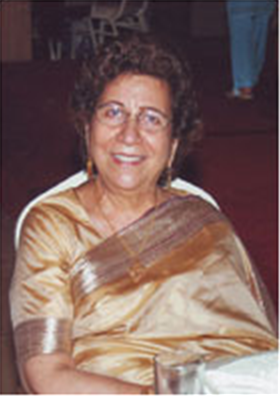Razia Fasih Ahmad
This is a collection of articles archived for the excellence of their content. Readers will be able to edit existing articles and post new articles directly |
Contents |
Razia Fasih Ahmad
Asif Farrukhi and Sehba Sarwar
Poetry is the ‘new found land’ for writer Razia Fasih Ahmad and her latest book is Qafas Zad, a collection of verses, followed by a collection of humourous articles. For diehard readers like yours truly, this indefatigable and versatile writer’s forte is the novel. This is the tenacious opening of our conversation one warm evening in Karachi where she is back for a short trip from her home in the US. As she talks about her two new novels and recent book launches, I can see that she is not one for sitting back contentedly on her laurels but rather feels the need to move on. An English version of her magnum opus Sadiyon Ki Zanjeer is now prescribed reading in an American university and Zakhm-i-Tanhai based on the lives of the Bronte sisters was launched a few months back in Karachi.
From newly released books she moves cautiously to talk about that work in progress. ‘I am writing about the times of my mother. It was common for women to have nine or 10 children and there were few facilities. It is the story of an ordinary woman who bore the responsibility of everything in those days, maintaining the household, children’s education, clothes and things. People today do not know how their mothers lived and how they had to struggle. History should not be confined to the exploits of kings and emperors but we should make an effort to find out how ordinary men and women lived in those days. We should make an effort to tell the younger generation what we had to go through in 1947, what were the conditions of Karachi in those days. Parents have not told their children all this,’ she says emphatically.
Razia Fasih Ahmed can celebrate a half centenary of writing. Her first story Natamam Tasweerain, based on the distant memories of her sister’s death, was published in the magazine Ismat in 1948. She recalls that she would send stories to magazines without a return address as she was afraid that her family might ridicule her or not believe that she wrote the stories. In spite of a long track record, she says that she has no fixed working habits. ‘It is not necessary that there should be peace and tranquility all around. I wrote some stories while we were moving houses. All my stuff was packed and I was busy writing a story’, she recalls. ‘The story came to me word by word, as if it was already written somewhere. Now I revise extensively.’
There is a change though. She has kept up with technology. ‘I write directly on the computer now. This is a new experience. I have also tried dictating a story.’
She has encountered the publishing scene in the US and has attended writing workshops. ‘The writers over there are working alongside the conditions over there. They are often told how the market is moving and what sells. I do not want to write according to those needs.’
But she has her own comments about the publishing scene here. She describes what she calls ‘dollar writers’ who have spoilt the scene. Those who pay in dollars to get their mediocre stuff published in Pakistan. ‘Because of them, publishers are wary of genuine writers too and make comments like: you live in America so money should be no problem for you. There are some writers who bring money, get their books printed here and distribute them to their circles of friends. Money is no issue for such people.’ And writing too is probably of no real concern.
‘Over the few months I have noticed that senior writers in Pakistan have become old and they make do with presiding over functions (sadaraton par guzara kar rahey hain). There are new writers but one does not know in which magazine the other is publishing his or her work. Literary magazines are few and keep to their limited circles.’
‘Some people say that my work has not received the critical attention it deserves, but I am not really worried about it. I have been out of this country for 22 years, yet people still remember my name. And that is more than satisfying for me.’
NOVELS
Seemeen published in 1964
Abla-Pa published in 1964
Intizar-e-Mosam-e-Gul published in 1965
Ek Jahan Aur Bhi Hai published in 1966
Mata-e-Dard published in 1969
Tapti Chhaun published in 1969
Azar-e-Ishq published in 1971
Atash Kada published in 1983
Sadiyon Ki Zanjeer published in 1986
Yeh Khwab Sare published in 1992
Collection of four Novels published in 2003
Do Novel published in 2006
Breaking Links published in English in 2006
Zakh'm-e-Tanhai Novel based on the life of the Bronte family of England. Charlotte, Emily, Ann Branwell Bronte authors of Jane Eyre, Wuthering Heights and many others - 2008. Winner of the Ahmad Nadeem Qasmi award for the best novel, 2007-2008
Aadhi Sacchayan Novel on Pakistani immigrants in United States - 2008
Aik Sadi Ki Kahani 2012
Rastay aur Manzilain 2013
TRAVELOGUES
Sair-e-Pakistan (for children) published in 1965
Safar Hai Shart serialized in Akhbar-e-Jahan, Karachi
Do Thay Musafir published in 1998
Sair Kar Dunya Ki published in 1998
Gul Dastay Aur Gul Dairay Shakhsi Khakay published in 2013
Namay Mere Naam Mashair Kay Khatoot published in 2013
COLLECTIONS OF SHORT STORIES
Aankh Micholi (for children) published in 1951
Do Patan Ke Beech published in 1966
Be Sumt Musafir published in 1979
Barish Ka Aakhri Qatra published in 1984
Kali Barf published in 1992
Virsa published in 2003
Majmua comprehensive collection of short stories published in 2006
Read stories in Urdu - Afsanay - افسانے
POETRY
Ghazal in Urdu
Maqtal a poem
Chak e Qafas a collection
Qafas Zad a collection
